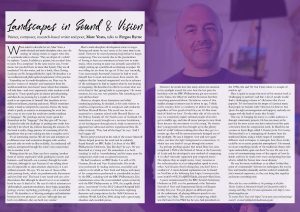Painter, composer, research-based writer and poet, Marc Yeats, talks to Fergus Byrne

When asked to describe his art, Marc Yeats, a multi-talented and multi-discipline artist, uses the analogy of asking a baker to suggest what slice of a particular cake to choose. ‘They are all part of a whole’ he explains. ‘I paint, I exhibit as a painter, but you don’t have to know I’m a composer.’ In the same way he says, ‘I write music, but you don’t have to know that I paint. They are all interlinked.’ He also writes, and has a book, Music, Painting, Landscape and Me, being published in April. He describes it as ‘an intellectual and philosophical exploration’ of his practice.
Expanding on his multi-disciplinary art, Marc says he receives ‘masses of stimulus’ and inspiration from the world around him, but doesn’t know where that stimulus will take him—and most importantly what medium it will end up in. ‘I may spend quite an intense period painting, and then do no painting for a couple of months.’ The result is an expression of himself that manifests in two different mediums, painting and music. Which sometimes makes it hard to interpret the outcome. Hence the book, which is partly an exercise in interpreting his work but also a way to try to put the result into another medium or ‘language’. ‘My paintings and my music speak for themselves in the “language” that they give off’ he says. ‘I wanted to take the challenge of putting into words how and why I do what I do, without knowing the answers. So the book is really a huge process of examining all of the ingredients that go into making me into a complete artist.’
It’s an interesting exercise. We all view and interpret art in different ways and sometimes disagree with another person’s take on work we like or dislike. An intellectual self analysis, interpreted through the artist’s own output takes this to another level.
Writing about his art, Marc says he is creating ‘another form of artistic expression’ while guiding his viewers and listeners—and himself—on a journey through his work. However, although he says ‘because it’s me talking about me, it’s impossible to claim absolute objectivity’, it is not without research. He says: ‘It’s not one of those coffee table painting books, which are predominantly illustrations and very little text.’ The book is text based with just a few illustrations. But although he doesn’t see it as an academic book he says ‘it kind of is.’ He says it’s full of references to ‘philosophers, quantum mechanics, fuzzy logic, geography, geology, science, mythology, psychology—it’s a researched book.’ He describes it as ‘drawing analogies and similarities between the two processes’ and says ‘although they are both very different, they are both very similar.’
Marc’s multi-discipline development came in stages. Painting and music he says ‘arose at the same time in my mind’. However he started painting long before he began composing. This was mainly due to the practicalities of having to learn an instrument or learn how to write music, when starting to paint was instantly accessible by simply picking up a paintbrush or drawing on paper. He was selling his art from the age of 15 but says ‘musically, I was increasingly frustrated’, because he had to teach himself how to read and write music from scratch. He explains that his ‘musical imagination’ was far in advance of the techniques he had to express what he was hearing or imagining. He describes his efforts to create what was in his head as like ‘giving birth to a porcupine.’ His music notation, he says, was very primitive ‘like something an 8 year-old has done’.
However, despite those limitations and while continuing painting, he decided, in his early thirties to send his compositions off to composer and conductor Sir Peter Maxwell Davies. The result was he was accepted to a summer school with Maxwell Davies on the Orkney Islands off the North coast of Scotland. He remembers it nearly brought on a nervous breakdown, as not having gone through music study in university he appeared less advanced and less experienced than the other students. ‘They had all the lingo’ he says. ‘And I had bugger all.’
But he persevered and at the end of the course Maxwell Davies helped promote his work and he suddenly found himself on BBC Radio 3 in front of the BBC Philharmonic Orchestra. ‘Just like that!’ he says. He was described as a ‘rising star’. He remembers it as both ‘exciting’ as well as ‘overwhelming’ and for many years his composition work took an upward trajectory.
He had broadcasts on BBC Radio 3 as well as US, German, Slovak and New Zealand radio. His works were performed by leading orchestras, ensembles and soloists as far afield as New York and Tokyo, with many of his compositions performed to considerable acclaim by the BBC, including with the BBC Philharmonic. Key commissions across the years included a piano concerto with the BBC Philharmonic in 1999, the acapella choral piece, ‘sturzstrom’ for the 2012 Cultural Olympiad held in the UK, vocal installations for hospitals exploring dementia and composition for the Hallé Orchestra to celebrate World Aids Day 2008, along with a great many chamber and ensemble pieces.
However, he recalls how like many artists, his moment in the spotlight waned. He cites how the last piece he had done with the BBC Philharmonic got rave reviews in the Times, the Observer and the Scotsman but then everything quietened down. He believes some of that sudden change in interest can be down to age. ‘I think in this country, there is a tendency to idolize the young, regardless of how good or bad they are. It’s like some kind of fetish we have.’ On the other side of the coin he says ‘we completely neglect talented people when they get to middle age, and take all career prospects away from them because the investment is in the young.’ He worries that ‘young people are then brought up in this glittery kind of world’ without realizing that when they get to a certain age they will be unceremoniously dropped out of the spotlight. He says it happens ‘over and over again’ unless you have the right background or connections, ‘in which case you kind of can go through the system.’
So, perhaps pushing against that trend, Marc has since completed a PhD at the School of Music at the University of Leeds and has developed a new method of composing. It is called ‘timecode supported poly temporal music.’ He explains that, in simple terms, ‘every musician in the orchestra plays in at an independent speed to every other. And because they’re doing that, you don’t have a conductor.’ A more detailed explanation can be found on YouTube at the following link: https://www.youtube.com/watch?v=HUA1oQBI50E&ab_channel=MarcYeats.
A piece commissioned by the BBC Scottish Symphony Orchestra in 2021 is to be premiered at the Tectonics Festival of New and Experimental Music in Glasgow in May this year. ‘I’ve got players in different parts of the auditorium, all playing different speeds to one another’ says Marc. This system of composing, which was the basis for his PhD, has he says, had precedents in the 1950s, 60s and 70s ‘but I have taken it a couple of notches up’.
Marc is quick to accept that most of his musical work is ‘challenging to perform’ and that ‘a lot of people would find it challenging to listen to.’ He knows that it’s not populist. ‘It’s not based on the tropes of classical music that people are familiar with.’ However, he believes that ‘given the right encouragement and support, anybody can engage with the kind of music that I make.’

One way of bringing his music to a wider audience is through community projects. He has run many in the past but his most recent one does indeed seem like quite a deviation from his composition work. In March he ran a course in Lyme Regis called 5 Shanties for the 21st Century. He described it as ‘a reimagining of shanties from the traditional idiom, using a whole range of completely different vocal techniques to reimagine how those words could be set to create particular atmospheres’. He wanted to create something outside of the traditional shanty style ‘quite melancholic, quite out there’ he says. He sees it as a way of communicating some of the aspects of how he thinks and how he works with music and putting that into what is called the ‘leisure time music domain.’
He sees his music workshops as an effort ‘to find that point of commonality’ between his techniques, the way he lives and breathes musically and the world of somebody else’s musical experience, so they can bring that together and create something new.
Marc also has a new exhibition of his paintings at the John Davies Gallery in Moreton-in-Marsh in Gloustershire which is running until May 11th. For more information visit: https://www.johndaviesgallery.com.
To contact Marc Yeats visit: https://www.marc-yeats.com/paintings/contact/ or email info@electricbackroom.org.uk.




